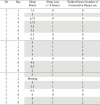Naturally Occurring Consecutive Sleep Loss and Day-to-Day Trajectories of Affective and Physical Well-Being
- PMID: 34223608
- PMCID: PMC8976290
- DOI: 10.1093/abm/kaab055
Naturally Occurring Consecutive Sleep Loss and Day-to-Day Trajectories of Affective and Physical Well-Being
Abstract
Background: Experimental studies have shown that just 1 night of sleep loss impairs next-day performance, mood, and energy. Yet, little is known about the effects of consecutive sleep loss on daily well-being in participants' own settings.
Purpose: This study examined whether and how naturally occurring consecutive sleep loss is associated with day-to-day trajectories of affective and physical well-being.
Methods: Participants were adults (N = 1,958) from the Midlife in the United States Study who provided daily diary data for eight consecutive days. Consecutive sleep loss was operationalized as the within-person number of consecutive nights with <6 hr of sleep. Multilevel models evaluated the linear, quadratic, and cubic effects of consecutive sleep loss on daily well-being, after controlling for sociodemographic, health, and daily covariates.
Results: Daily negative affect increased and positive affect decreased in curvilinear fashion as the number of consecutive sleep loss increased. For example, daily negative affect increased (linear), but the rate of increase decelerated as the number of consecutive sleep loss increased (quadratic). Results were consistent for the number and severity of physical symptoms. For negative affect and the severity of physical symptoms, cubic effect was also significant such that the rate of increase accelerated again in the days most distal to baseline (no sleep loss).
Conclusions: Consecutive sleep loss was associated with degraded trajectories of daily affective and physical well-being. Making efforts to break the vicious cycle of sleep loss may protect daily well-being in adults whose sleep time is often compromised.
Keywords: Chronic sleep restriction; Daily diary; Insufficient sleep; Physical symptoms; Sleep debt; emotions.
© Society of Behavioral Medicine 2021. All rights reserved. For permissions, please e-mail: journals.permissions@oup.com.
Figures


References
Publication types
MeSH terms
Grants and funding
LinkOut - more resources
Full Text Sources
Medical

